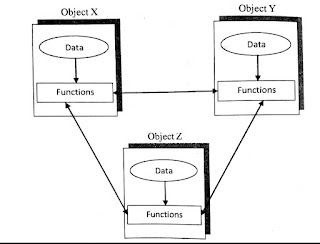Programming in C++
Object Oriented Concepts
Introduction and Evolution of programming languages
The computer technology has evolved at such a fast rate that yesterday's
(i.e, some 25 years ago) mainframes are today's personal computers. The
software industry is also growing at the same rate proportionally. The
operations are becoming more and more complex but, more user friendly, and
the
software engineers felt that it was difficult to implement these complex designs using traditional programming languages (i.e., procedural languages or structured programming languages). The programming languages that adopted the procedural and structured programming approach were PASCAL C. COBOL, etc. Generally these languages deal with two important aspects - data and algorithm.
software engineers felt that it was difficult to implement these complex designs using traditional programming languages (i.e., procedural languages or structured programming languages). The programming languages that adopted the procedural and structured programming approach were PASCAL C. COBOL, etc. Generally these languages deal with two important aspects - data and algorithm.
Data is the main substance of the program and the algorithms are the methods
that use these programs. They found that these traditional methods of
programming was lengthy, expensive, error prone, lacked reusability,
difficult to maintain and sometimes even disastrous. Therefore, this lead to
the revival of the third generation languages and the result was the fourth
generation which further gave birth to the fifth generation languages which
was called as Object Oriented Programming System concepts (OOP).
Procedural Programming
The procedural programming focuses on processing of instructions in order
to perform a desired computation. Therefore it emphasizes more on doing
things i.e. on algorithms. Programming using procedural languages set a threat as the length and complexity of the
problem increased. For example, procedural programs make use of branching statements, where the flow of
control changes its path according to the result of the test expression. Many programs had these routing and
it was difficult to understand and modify them
Structured Programming
The difficulties in procedural programming languages gave a way to the
scientists to
develop C language which was better language when compared to the procedural
languages. It gave a new idea of programming approach called as
Structured Programming approach was a disciplined approach which
limited the branching to a small set of well-behaved construction (i.e.,
if-else statement, for loop, while loop, do while loop and so on). C
followed the
top-down principle of programming. The idea of Top-down design is to break a large program into smaller programs, and the smaller programs into still smaller sub-programs further until it can be implemented for computer solution. However, the structured programming technique reflected the procedural programming method itself, because it lacked the required clarity, reliability and ease of program maintenance as the program length grew in its size. The major drawback of both the procedural and structured programming is that it is very difficult to model the real world using these methods
top-down principle of programming. The idea of Top-down design is to break a large program into smaller programs, and the smaller programs into still smaller sub-programs further until it can be implemented for computer solution. However, the structured programming technique reflected the procedural programming method itself, because it lacked the required clarity, reliability and ease of program maintenance as the program length grew in its size. The major drawback of both the procedural and structured programming is that it is very difficult to model the real world using these methods
Object oriented Programming
OOP emphasizes on data unlike the structured programming which emphasizes on program i.e.the ideology here is to unite both the data and the functions that operate on that data into a single unit called as "object".This can be pasteurized as shown in fig
Figure: Objects
Therefore,an object is an identifiable entity with some characteristics and behavior.
Object Oriented Programming (OOP) is a concept that combines both the data and the that operate on that data into a single unit called the object.
Object is an identifiable entity with some characteristics and behavior.
Top-down design is an approach of dividing a problem into sub problems and then dividing the sub problems further into still smaller sub problems until it can be implemented for a computer solution
Bottom up design is the vice versa where solutions to smaller modules are integrated together the solution of the overall program


Nice 👍
ReplyDeleteNice 👍
ReplyDeleteThank you . Stay tuned :)
ReplyDelete